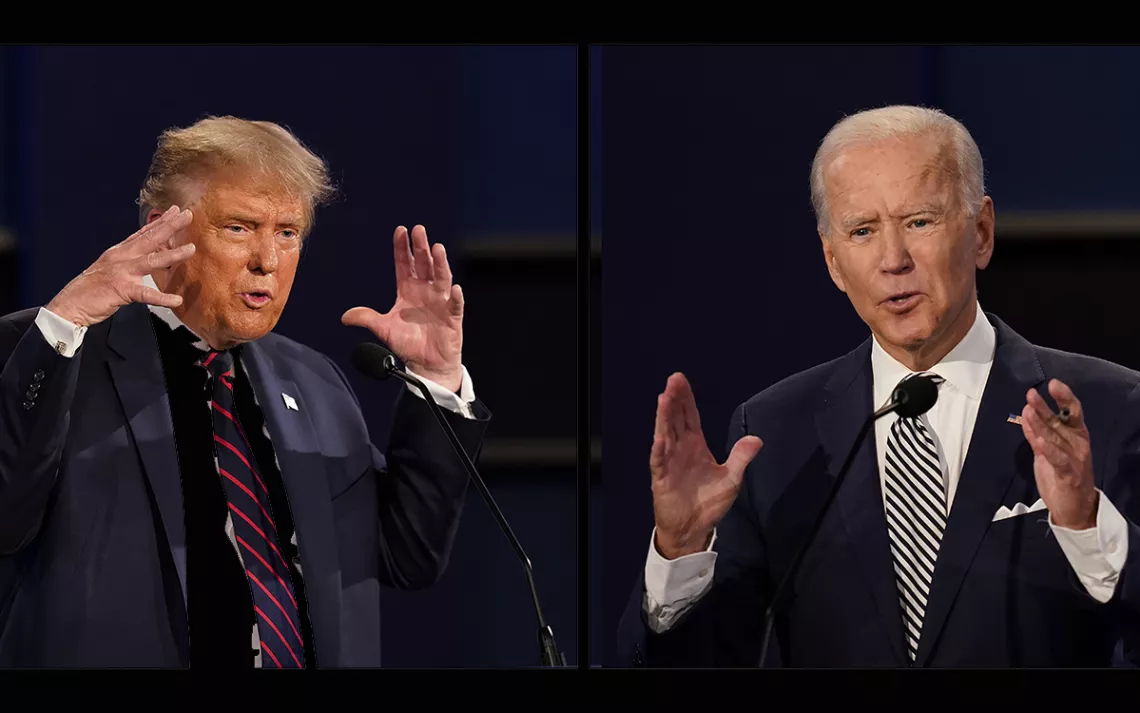Climate Change Became a Debate Question Because You Asked for It
The candidates couldn’t avoid talking about the biggest issue on Earth

Photo by AP Photo/Patrick Semansky
The moment came one hour and 13 minutes into the first 2020 presidential debate, when Fox News anchor Chris Wallace said, “I think the American people would like to hear about more substantial subjects,” and then declared, “You know, I’d like to talk about climate change.”
Across the United States, climate change activists swooned in some combination of disbelief and relief that the existential crisis facing civilization had—at last!—become a matter of presidential debate. In 2016, the presidential debate moderators didn’t ask a single question about climate in the three Clinton-Trump meetings. Four years earlier, it was also zilch during the Obama-Romney exchanges. In Cleveland on Tuesday, climate change finally emerged as an unavoidable topic for anyone seeking to lead the United States in the 21st century.
Climate chaos made it onto Chris Wallace’s list of substantial subjects because the grassroots movements for sustainability and justice—along with the planet itself—put it there.
Before making too much of a 10-minute television exchange (if you can call it that) about climate change, let’s acknowledge that the “debate” was a complete debacle. On cue, Trump exceeded expectations with his signature mix of blatant lies, brazen disrespect, and fascist instincts and managed to bring American democracy to a new low. On CNN, commentator Dana Bash called it a "shit show” while Jake Tapper said it was a “disgrace.” The Washington Post described the “chaos” as an “exhausting mess.” Van Jones said it left Americans “disgusted, sad, and angry.”
Environmentalists watching the debacle likely felt some different emotions around minute 73: Surprise, shock, and happiness that climate change had even appeared on the screen.
About a week ago, Wallace announced the subjects he would ask the candidates about. The COVID-19 pandemic, the Supreme Court, and “race and violence in our cities” were among them. Climate chaos was not. This gross omission led to much gnashing of teeth among enviros and environmental journalists. It prompted Washington Post media columnist Margaret Sullivan to blast Wallace for the “abject failure” to not address “the subject that should matter much more to young and old alike: the survival of the planet.”
So Wallace’s sudden interest in talking about climate change came out of left field.
Like the rest of the night, the climate discussion was less than illuminating. Trump dodged Wallace’s direct question about whether he agreed that “human pollution … contributes to the warming of the planet.” He trotted out his usual nonsense about forest hygiene. He spent a long time in a digression about European “forest cities” (whatever that is).
For his part, Biden was, well, pretty good—which still makes him a couple of livable planets better than Trump. He was strong and forceful about the need to transition off of fossil fuels: “No one’s gonna build another coal-fired plant in America.” He made the case for how the transition to clean energy will be an economy-wide shot in the arm: “The fact is, it [a climate smart industrial policy] is gonna create millions of good-paying jobs. It’s gonna make the economy safer. … We can create hard, hard good jobs by making sure the environment is clean.” Biden even made a plug for an international plan to protect the Amazon rainforest: “Stop tearing down the forest.”
Even though it was a surprisingly substantive discussion, the climate segment still came with frustrations and disappointments. Trump went into his nonsense that the Green New Deal will make it so that “airplanes are out of business, where two-car systems are out.” Biden got backed into disowning the Green New Deal and parroting right-wing talking points. There was a silly back-and-forth (the debate’s umpteenth) about whether Trump had pursued nuking an Atlantic hurricane to make it go away. (Trump: “I never said that. They made it up.” Biden: “You did say it.”)
But hopefully you didn’t leave the debate discouraged or disillusioned. Keep in mind that, according to a calculation by meteorologist and climate correspondent Eric Holthaus, the 10 minutes of climate discussion in Cleveland was about twice as much climate conversation as has happened in the 1988, 1992, 1996, 2000, 2004, 2008, 2012, and 2016 presidential debates combined.
Maybe this is little more than crumbs at the circus. After all, it’s 2020 and the political-media establishment is just now getting around to addressing the greatest threat to global human well-being and the abundance of life on the planet.
But now is better than never. That a Fox newsman like Chris Wallace decided to force the issue on climate shows how the grassroots movement has forced the topic near the top of the political agenda. It also proves that, when it comes to who will stand atop the largest economy and most powerful military in the world, nature calls the question.
 The Magazine of The Sierra Club
The Magazine of The Sierra Club